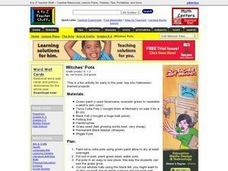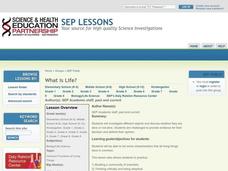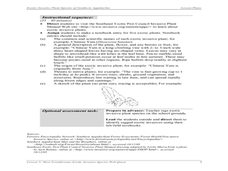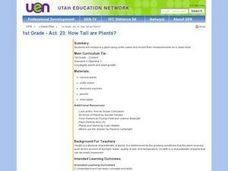Curated OER
The History of Rice
Third graders explore the history of rice. In this history of rice lesson students use a timeline to help determine important events in the spread of rice throughout the world. They use a map to locate rice production in the United States.
Curated OER
Witches' Pots
Students make a Halloween project and then write the procedure on how to make the witch.
Curated OER
Forest Food Web
Students explore the elements of a forest ecosystem. They examine the elements needed to form a forest food web. Students construct and describe food webs that include nonliving elements of the ecosystem.
Curated OER
Explorit's Fruit Salad Quiz
In this online interactive plant quiz worksheet, students respond to 6 multiple choice questions that require them to identify the Latin names of plants.
Curated OER
Plant Reproduction
In this plant reproduction worksheet, students follow the steps to complete a science investigation and then respond to 2 short answer questions and complete a data table regarding the investigation.
Alabama Learning Exchange
Why Roots, Stems, and Leaves are Important
Young scholars use the Internet to research the importance of leaves, stems and roots to plants. They participate in a hands-on experiment to identify the functions of different plant parts.
Curated OER
Plant Adaptations
Students identify parts of prairie plants. They sketch the plants indicating its adaptive parts and write brief descriptions of them. They present their findings to the class.
Curated OER
Creating an Experimental Design
Pupils research the damage to the environment by certain plant species. They create an experimental design which they test how these species take over certain habitats. They share their information with the class.
Curated OER
Investigation Xylem
Students investigate how water travels up the stem of vascular plants by using food coloring to stain the xylem of a number of different plants. They know the function of leaves, stems, and root at the end of the experiment.
Curated OER
Rise of Industry
In this United States history worksheet, students utilize a word bank of 10 terms or phrases to answer 10 fill in the blank questions pertaining to the Industrial Revolution. A short answer question is included as well.
Curated OER
Spring Word Search
In this spring activity worksheet, learners use the 50 words in the word bank to locate and identify them in the word search puzzle.
Curated OER
Searching for Spring ...
In this spring activity worksheet, students use the 30 words in the word bank to locate and identify them in the word search puzzle.
Curated OER
Spring Challenge
In this spring activity worksheet, students use the 79 words in the word bank to locate and identify them in the word search puzzle.
Curated OER
What is Life?
Students investigate the characteristics of living things. In this life science lesson, students examine several living and non-living specimens. Students determine which things are living and non-living.
Curated OER
Most Troublesome Exotic Invasive Plant Species Web Quest
Learners participate in a Web Quest activity in which they identify common exotic invasive plant species of the Southern Appalachian Region. After identifying the top 10 exotic invasive species, they choose one to research in depth.
Curated OER
Benny's Pennies
Pupils read Benny's Pennies and predict what Bennie will buy with each penny based on the illustrations. They locate rhyming words and make a chart of what Benny bought and also for what they would have bought.
Curated OER
Plants
Second graders examine the characteristics of plants. As a class, they brainstorm a list of items plants need in order to survive. In groups, they complete various experiments in which they discover the functions of the parts of the plant.
Curated OER
Arbor Day Challenge: Crossword Puzzle
In this Arbor Day crossword puzzle, students use a set of 28 clues given at the bottom of the page to complete the puzzle; clues are related to Arbor Day.
Curated OER
Life in a Cup
Third graders make and maintain a mini terrarium. They keep a daily journal of what happens in their terrarium and record daily observations and measurements.
Curated OER
Bean and Ozone Project
Students performed an experiment in which they grew beans in an ozone chamber and some in regular air in order to see if the ozone causes damage to the plants.
Curated OER
Little Bloomers: Gardening With Trees
Students identify the parts of tree flowers. They examine the role they have in pollination. They discuss trees that do not flower as well.
Curated OER
A DAY WITHOUT AG
Students consider and discuss the meaning of the word "agriculture" and how agriculture affects their lives every day. Students identify the various ways that agriculture touches their personal lives. Students use worksheets to list all...
Curated OER
How Tall are Plants?
First graders measure a plant using unifix cubes and record their measurements on a class chart.
Curated OER
The Grass is Always Greener
Third graders experiment with common grass and cellular division.

























